| Listing 1 - 10 of 54 | << page >> |
Sort by
|
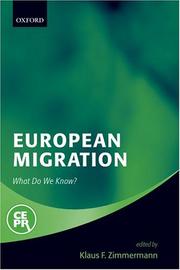
ISBN: 0199257353 9780199257355 9786610759071 0191555231 1280759070 1423786653 9780191555237 9781423786658 6610759073 9781280759079 1383039860 Year: 2005 Publisher: Oxford Oxford University Press
Abstract | Keywords | Export | Availability | Bookmark
 Loading...
Loading...Choose an application
- Reference Manager
- EndNote
- RefWorks (Direct export to RefWorks)
Developed countries, especially in Europe, face a number of issue related to migration: social and economic disruptions caused by the declining demand for unskilled labour and resulting unemployment, a shortage of skilled labour in many professions, increasing international competition for highly qualified human capital, radical demographic changes, and the expansion of the European Union. However, there is a growing impression that migration does serve less and less the needs of the labour market. This suggests a stronger focus on economic channels of immigration, for which the book provides a conceptual basis and the required empirical facts and institutional background.
Migration. Refugees --- Europe --- Labor mobility --- Migrant labor --- Foreign workers --- Labor market --- Main-d'oeuvre --- Travailleurs migrants --- Travailleurs étrangers --- Marché du travail --- Mobilité --- Emigration and immigration. --- Emigration et immigration --- 312.0 --- EEC / European Union - EU -Europese Unie - Union Européenne - UE --- NBB congres --- 304.84 --- Volksverhuizingen. Kolonisatie: algemeenheden. --- Conferences - Meetings --- Alien labor --- Europe -- Emigration and immigration. --- Foreign workers -- Europe. --- Labor market -- Europe. --- Labor mobility -- Europe. --- Migrant labor -- Europe. --- Labor & Workers' Economics --- Business & Economics --- Travailleurs étrangers --- Marché du travail --- Mobilité --- Labor, Migrant --- Migrant workers --- Migrants (Migrant labor) --- Migratory workers --- Transient labor --- Mobility, Labor --- Employees --- Casual labor --- Migration, Internal --- Labor supply --- Labor turnover --- European migration --- Migration --- CEPR --- E-books --- Volksverhuizingen. Kolonisatie: algemeenheden --- EUROPE --- Migrations européennes --- EMIGRATION ET IMMIGRATION --- Emigration and immigration --- Anthropology --- Sociology.
Book
ISBN: 354068381X 3642087973 9786610817719 1280817712 3540683828 Year: 2007 Publisher: Berlin ; New York : Springer,
Abstract | Keywords | Export | Availability | Bookmark
 Loading...
Loading...Choose an application
- Reference Manager
- EndNote
- RefWorks (Direct export to RefWorks)
German and European immigration policies have only recently begun to cope with the inevitable: growing labor demand in the face of high unemployment and a shrinking labor force due to demographic change. Despite the implementation of Germany's first immigration act and several European initiatives towards legal harmonization at the EU level, an actively controlling immigration policy, which would be needed to master the challenges ahead, is not yet in sight. Against this background, the book draws conclusions from the German history of immigration policy. It analyzes the country's future demand for immigration and develops an economic model for the effective selection and integration of labor migrants that could provide the foundation for a joint European immigration strategy. "Western Europe, and in particular Germany, have come to realize that they are regions of substantial net immigration. This book develops prospects for future trends in German and European immigration policies. It is an essential input into any serious public policy discussion of European immigration issues." Barry Chiswick, University of Illinois at Chicago, leading US immigration expert "Legal migration should be managed rather than endured. To show policy makers and citizens under which circumstances legal migration can be beneficial, research is needed and puzzles need to be solved. Which criteria should be applied? What can we learn from traditional migration countries? What role is there for Europe? This book is a valuable contribution to these pertinent questions." Marcel Canoy, Bureau of European Policy Advisers, Directorate General of the European Commission.
Emigration and immigration --- Emigration et immigration --- Economic aspects --- Aspect économique --- Germany --- European Union countries --- Allemagne --- Pays de l'Union européenne --- Government policy --- Politique gouvernementale --- Alien labor. --- Foreign workers --- Labor & Workers' Economics --- Business & Economics --- Government policy. --- Aspect économique --- Pays de l'Union européenne --- EPUB-LIV-FT LIVECONO LIVGESTI SPRINGER-B --- Alien labor --- Aliens --- Foreign labor --- Guest workers --- Guestworkers --- Immigrant labor --- Immigrant workers --- Migrant labor (Foreign workers) --- Migrant workers (Foreign workers) --- Employment --- Weimar Republic --- Germanii︠a︡ --- Германия --- BRD --- FRN --- Jirmānīya --- جرمانيا --- Nimechchyna --- Gjermani --- Federalʹna Respublika Nimechchyny --- Veĭmarskai︠a︡ Respublika --- Ashkenaz --- Germanyah --- Bundesrepublik Deutschland --- Federal Republic of Germany --- Deutschland --- Repoblika Federalin'i Alemana --- República Federal de Alemania --- Alemania --- República de Alemania --- Bu̇gd Naĭramdakh German Uls --- Kholboony Bu̇gd Naĭramdakh German Uls --- KhBNGU --- ХБНГУ --- German Uls --- Germania --- Republika Federal Alemmana --- Deutsches Reich --- Grossdeutsches Reich --- Weimarer Republik --- Vācijā --- Social policy. --- Labor economics. --- Economics. --- Labor Economics. --- Social Policy. --- Economics --- National planning --- State planning --- Economic policy --- Family policy --- Social history --- ドイツ --- Doitsu --- ドイツ連邦共和国 --- Doitsu Renpō Kyōwakoku --- Germany (Territory under Allied occupation, 1945-1955) --- Germany (Territory under Allied occupation, 1945-1955 : British Zone) --- Germany (Territory under Allied occupation, 1945-1955 : French Zone) --- Germany (Territory under Allied occupation, 1945-1955 : Russian Zone) --- Germany (Territory under Allied occupation, 1945-1955 : U.S. Zone) --- Germany (East) --- Germany (West) --- Holy Roman Empire --- Employees --- Economic aspects. --- Deguo --- 德国 --- Gėrman --- Герман Улс --- ドイツ レンポウ キョウワコク

ISBN: 3540507922 0387507922 3642500455 3642500439 9780387507927 9783540507925 Year: 1989 Publisher: Berlin: Springer,
Abstract | Keywords | Export | Availability | Bookmark
 Loading...
Loading...Choose an application
- Reference Manager
- EndNote
- RefWorks (Direct export to RefWorks)
Population --- Economic aspects --- 314.8 --- -#SBIB:314H110 --- #SBIB:314H270 --- Human population --- Human populations --- Population growth --- Populations, Human --- Economics --- Human ecology --- Sociology --- Demography --- Malthusianism --- Bevolkingsbeweging. Bevolkingsoptimum. Bevolkingsgroei. Demografische verand eringen. Loop der bevolking --- Bevolkingsstudies en theorieën: algemeen --- Demografie en economische interrelaties: algemeen --- Economic aspects. --- 314.8 Bevolkingsbeweging. Bevolkingsoptimum. Bevolkingsgroei. Demografische verand eringen. Loop der bevolking --- #SBIB:314H110 --- Population - Economic aspects
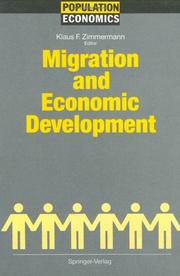
ISBN: 3540555579 3642634869 3642581560 Year: 1992 Publisher: Berlin Springer
Abstract | Keywords | Export | Availability | Bookmark
 Loading...
Loading...Choose an application
- Reference Manager
- EndNote
- RefWorks (Direct export to RefWorks)
Emigrant remittances --- Turks --- Immigrant remittances --- Remittances, Emigrant --- Foreign exchange --- Developing countries --- Europe --- Germany --- Turkey --- Weimar Republic --- Germanii︠a︡ --- Германия --- BRD --- FRN --- Jirmānīya --- جرمانيا --- Nimechchyna --- Gjermani --- Federalʹna Respublika Nimechchyny --- Veĭmarskai︠a︡ Respublika --- Ashkenaz --- Germanyah --- Bundesrepublik Deutschland --- Federal Republic of Germany --- Deutschland --- Repoblika Federalin'i Alemana --- República Federal de Alemania --- Alemania --- República de Alemania --- Bu̇gd Naĭramdakh German Uls --- Kholboony Bu̇gd Naĭramdakh German Uls --- KhBNGU --- ХБНГУ --- German Uls --- Germania --- Republika Federal Alemmana --- Deutsches Reich --- Grossdeutsches Reich --- Weimarer Republik --- Vācijā --- Germany (Territory under Allied occupation, 1945-1955) --- Germany (Territory under Allied occupation, 1945-1955 : British Zone) --- Germany (Territory under Allied occupation, 1945-1955 : French Zone) --- Germany (Territory under Allied occupation, 1945-1955 : Russian Zone) --- Germany (Territory under Allied occupation, 1945-1955 : U.S. Zone) --- Germany (East) --- Germany (West) --- Holy Roman Empire --- Emerging nations --- Fourth World --- Global South --- LDC's --- Least developed countries --- Less developed countries --- Newly industrialized countries --- Newly industrializing countries --- NICs (Newly industrialized countries) --- Third World --- Underdeveloped areas --- Underdeveloped countries --- Emigration and immigration. --- Emigration and immigration --- Government policy. --- ドイツ --- Doitsu --- ドイツ連邦共和国 --- Doitsu Renpō Kyōwakoku --- ドイツ レンポウ キョウワコク --- Deguo --- 德国 --- Gėrman --- Герман Улс
Book
ISBN: 354015972X Year: 1985 Publisher: Berlin Springer
Abstract | Keywords | Export | Availability | Bookmark
 Loading...
Loading...Choose an application
- Reference Manager
- EndNote
- RefWorks (Direct export to RefWorks)
Multi
ISBN: 9783319573656 3319573659 Year: 2020 Publisher: Cham : Springer International Publishing : Imprint: Springer,
Abstract | Keywords | Export | Availability | Bookmark
 Loading...
Loading...Choose an application
- Reference Manager
- EndNote
- RefWorks (Direct export to RefWorks)
This handbook provides an integrated picture of knowledge about the economic and social behaviors and interactions of human beings on markets, in households, in companies and in societies. With a core basis in labor economics, human resources, demography and econometrics, it contains a large and complete summary and evaluation of the scientific state of the art. It relates to relevant fields in law, behavioral science, psychology, health, biology, sociology and political science, among others, where basic human processes are considered. Long survey chapters on core knowledge are combined with shorter frontier research chapters and those with a clear policy perspective. Section Editors Prof. M. Niaz Asadullah University of Malaya Faculty Of Economics And Administration Kuala Lumpur Malaysia University of Oxford Centre on Skills, Knowledge & Organisational Performance Oxford UK University of Reading Dept of Economics Reading UK University of Manchester School of Education, Environment and Development (SEED), Manchester UK IZA Institute of Labor Economics Bonn Germany Section: Development and Labor Dr. Nick Drydakis Anglia Ruskin University School of Economics and International Business, Centre for Pluralist Economics, Faculty of Business and Law Cambridge UK University of Cambridge, Pembroke College Cambridge UK University of Cambridge Centre for Science and Policy Cambridge UK Institute for the Study of Labor Bonn Germany Global Labor Organization Essen Germany Section: Gender Prof. Gil Epstein Bar-Ilan University Ramat Gan Israel Section: Political Economy (of Human Resources) Prof. Alfonso Flores-Lagunes Syracuse University Center for Policy Research; Institute of Labor Economics (IZA) and Global Labor Organization (GLO) Syracuse, NY USA Section: Methods and Data Prof. Colm Harmon University of Edinburgh Old College Edinburgh EH8 9YL UK Section: Education: Schooling: Human Capital Uwe Jirjahn University of Trier Trier Germany Section: Worker representation, labor-management relations; labor standards Prof. Dave E. Marcotte American University Department of Public Administration and Policy Department of Public Administration and Policy, School of Public Affairs Washington, DC USA Section: Risky behaviors Dr Milena Nikolova University of Groningen Faculty of Economics and Business Groningen The Netherlands http://www.milena-nikolova.com Section: Welfare, Well-Being, Happiness Dr. Olga Popova Leibniz Institute for East and Southeast European Studies (IOS) Landshuter Str.4 93047 Regensburg Germany Section: Religion Prof. Enrico Rettore University of Padova Department of Economics and management Padova Italy Section: Program Evaluation Dr. Eva M. Sierminska Luxembourg Institute of Socio-Economic Research (LISER) Esch-sur-Alzette, Belval Luxembourg Section: Inequality and Poverty Prof. Kompal Sinha Macquarie University Department of Economics Balaclava Rd Sydney 2109, NSW Australia Section: Health Prof. Marie Claire Villeval Centre National de la Recherche Scientifique (CNRS), University of Lyon GATE UMR 5824 Ecully, Lyon France CORTEX Laboratory of Excellence Lyon France Section: Behavioral Economics Prof. Victoria Vernon SUNY Empire State College Department of Accounting, Economics & Finance 325 Hudson Street New York NY 10013 USA Section: Household Economics Prof. Dr. Marco Vivarelli Università Cattolica del Sacro Cuore Department of Economic Policy Milan Italy Section: Technological Changes and the Labor Market Prof. Klaus F. Zimmermann Princeton University Department of Economics Princeton USA Maastricht University Center for Population, Development and Labour Economics at UNU – MERIT Maastricht The Netherlands University of Bonn Bonn Germany Section: Migration.
Statistical science --- Demography --- Labour economics --- Development aid. Development cooperation --- Economics --- Industrial psychology --- Personnel management --- gedrag (mensen) --- demografie --- economie --- statistiek --- coaching --- arbeid --- Labor economics. --- Population. --- Personnel management. --- Statistics. --- Education—Economic aspects. --- Behavioral economics. --- Labor Economics. --- Population Economics. --- Human Resource Management. --- Statistics for Business, Management, Economics, Finance, Insurance. --- Education Economics. --- Behavioral/Experimental Economics. --- Psychological aspects.
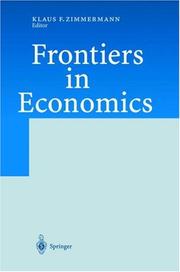
ISBN: 354043254X Year: 2002 Publisher: Berlin Springer
Abstract | Keywords | Export | Availability | Bookmark
 Loading...
Loading...Choose an application
- Reference Manager
- EndNote
- RefWorks (Direct export to RefWorks)
Economic policy --- Economics --- Finance, Public --- Institutional economics --- International finance --- Labor economics --- Macroeconomics --- Monetary policy --- Welfare economics --- History --- Research
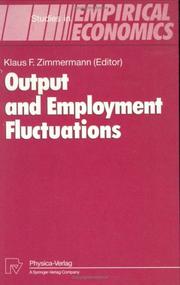
ISBN: 3790807540 Year: 1994 Publisher: Berlin : Springer-Verlag,
Abstract | Keywords | Export | Availability | Bookmark
 Loading...
Loading...Choose an application
- Reference Manager
- EndNote
- RefWorks (Direct export to RefWorks)
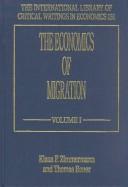
ISBN: 1858987563 9781858987569 Year: 2002 Volume: 151 Publisher: Aldershot: Elgar,
Abstract | Keywords | Export | Availability | Bookmark
 Loading...
Loading...Choose an application
- Reference Manager
- EndNote
- RefWorks (Direct export to RefWorks)
Migration. Refugees --- Sociology of minorities --- Emigration and immigration --- Foreign workers --- Emigration et immigration --- Travailleurs étrangers --- Economic aspects. --- Government policy. --- Aspect économique --- Politique gouvernementale --- Alien labor. --- Government policy --- !OVERZICHTSWERKEN -- 331.6 --- GOVERNMENT POLICY -- 331.6 --- 331.5 --- 304 --- 314.7 --- 325 --- #SBIB:023.IO --- #SBIB:314H250 --- #SBIB:314H270 --- #SBIB:35H431 --- Arbeidsmarkt. Werkgelegenheid --(algemeen) --- Sociale politiek. Maatschappelijke opbouw. Sociale problemen, vraagstukken --- Migratie. Geografische mobiliteit. Verhuizingen--(demografie) --- Landverhuizing. Kolonisatie. Immigratie. Emigratie --(politiek) --- Migratie: algemeen --- Demografie en economische interrelaties: algemeen --- Beleidssectoren: binnenlands beleid en justitie --- Alien labor --- -Emigration and immigration --- -#SBIB:023.IO --- Immigration --- International migration --- Migration, International --- Population geography --- Assimilation (Sociology) --- Colonization --- Aliens --- Foreign labor --- Guest workers --- Guestworkers --- Immigrant labor --- Immigrant workers --- Migrant labor (Foreign workers) --- Migrant workers (Foreign workers) --- Employees --- Economic aspects --- Employment --- 325 Landverhuizing. Kolonisatie. Immigratie. Emigratie --(politiek) --- 314.7 Migratie. Geografische mobiliteit. Verhuizingen--(demografie) --- 304 Sociale politiek. Maatschappelijke opbouw. Sociale problemen, vraagstukken --- 331.5 Arbeidsmarkt. Werkgelegenheid --(algemeen) --- Travailleurs étrangers --- Aspect économique --- Noncitizen labor --- Noncitizens --- Emigration and immigration - Economic aspects. --- Emigration and immigration - Government policy --- Emigration and immigration - Government policy. --- EMIGRATION ET IMMIGRATION --- TRAVAILLEURS ETRANGERS --- ASPECTS ECONOMIQUES --- POLITIQUE GOUVERNEMENTALE --- Émigration et immigration
Book
ISBN: 3540511407 3642837891 9783540511403 Year: 1989 Publisher: Berlin: Springer,
Abstract | Keywords | Export | Availability | Bookmark
 Loading...
Loading...Choose an application
- Reference Manager
- EndNote
- RefWorks (Direct export to RefWorks)
In recent years, population economics has become increasingly popular in both economic and policy analysis. For the inquiry into the long term development of an economy, the interaction between demographic change and economic activity cannot be neglected without omitting major aspects of the problems. This volume helps to further developments in theoretical and applied demographical economics covering the issues of demographic change and economic development. The interaction between demographic change and economic development in the long run is one central issue. One conjecture is that it is mainly the relative population pressure which controls the pace of economic development. However, econometric evidence presented in the book does not support this hypothesis. Other papers deal with the relationships between fertility and business cycle fluctuations, the timing of births, the efficiency in intergenerational transfers, the role of open economies for the population issue, historical perspectives of demographic change in Hungary and an outline of recent developments of applied modelling using input-output models, programming models or econometric techniques.
Economic conditions. Economic development --- Demography --- Economic development --- Business. --- Management science. --- Population. --- Demography. --- Economics. --- Population Economics. --- Business and Management, general.
| Listing 1 - 10 of 54 | << page >> |
Sort by
|

 Search
Search Feedback
Feedback About UniCat
About UniCat  Help
Help News
News